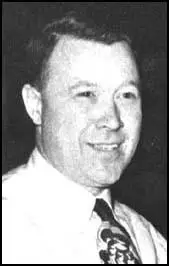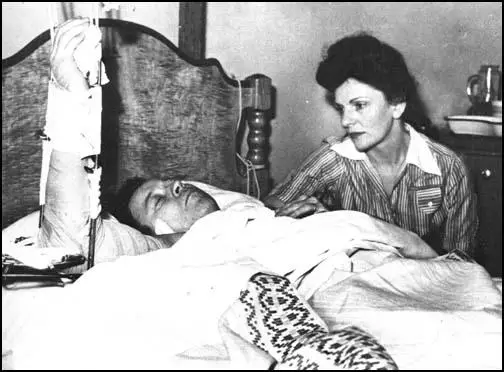Walter Reuther

Walter Reuther, the son of a trade union and socialist activist, was born in Wheeling, West Virginia, on 1st September, 1907. At sixteen he became an apprentice tool and die maker and three years later moved to Detroit.
In 1929 Reuther enrolled at Detroit City College to study law. He became president of the Social Service Club (the campus arm of the Socialist Party). While at college Reuther arranged for leading socialists such as Norman Thomas and Scott Nearing to speak at meetings.
Reuther joined the Ford Motor Company but his union activities resulted in him losing his job in 1933. Unable to find work during the Great Depression, Reuther left the United States and eventually found employment in an automobile factory in the Soviet Union. Unhappy with the lack of political freedom in the country, Reuther returned to the United States where he found employment at General Motors and became an active member of the United Automobile Workers (UAW).
Reuther remained active in the Socialist Party and in 1937 failed in his attempt to be elected to the Detroit City Council. However, impressed by the efforts by President Franklin D. Roosevelt to tackle inequality, he eventually joined the Democratic Party.
Reuther led several strikes and in 1937 and 1940 was hospitalized after being badly beaten by strike-breakers. He also survived two assassination attempts during this period although one attack left his right hand permanently crippled.
Reuther gradually became a leading figure in the United Automobile Workers (UAW) and in 1946 was elected president after a bitter struggle with supporters of the American Communist Party. Six years later Reuther succeeded Philip Murray as president of the Congress for Industrial Organisation(CIO).
After the Second World War Reuther emerged as one of trade union's leading progressive figures. His support for civil rights and social welfare legislation made him unpopular with conservatives. In the early 1950s the Senate Select Committee on Labor began investigating the trade union movement. Robert Kennedy, chief counsel of the committee, began investigating James Hoffa and the Teamsters Union. Hoffa was a well-known supporter of the Republican Party, and party members on the committee, including Joe McCarthy, Barry Goldwater and Karl Mundt, insisted that trade union leaders associated with the Democratic Party should also be investigated. Reuther was charged but Robert Kennedy discovered no evidence of corruption.
Under Reuther's leadership the UAW grew to 1.5 million members. A successful negotiator, in 1955 he managed to obtain an agreement that gave auto workers almost as much take-home pay when laid off as when at work.
In 1955 the CIO merged with the American Federation of Labour (AFL). George Meany became president of the AFL-CIO and Reuther was appointed vice-president.
Reuther was an active supporter of African American civil rights and participated in both the March on Washington for Freedom and Jobs (August, 1963) and the Selma to Montgomery March (March, 1965).
Reuther found George Meany conservative and dictatorial and in 1968 led the out of the AFL-CIO federation. The following year he joined with the Teamsters Union to form Alliance for Labor Action. Walter Reuther, who was active in the campaign against the Vietnam War, was killed in a plane crash in Pellston, Michigan, on 9th May, 1970.

Primary Sources
(1) Walter Reuther, speech at the March on Washington for Jobs and Freedom (28th August, 1963)
I am here today with you because with you I share the view that the struggle for civil rights and the struggle for equal opportunity is not the struggle of Negro Americans but the struggle for every American to join in.
For 100 years the Negro people have searched for first-class citizenship and I believe that they cannot and should not wait until some distant tomorrow. They should demand freedom now. Here and now.
It is the responsibility of every American to share the impatience of the Negro American. And we need to join together, to march together, and to work together until we have bridged the moral gap between American democracy's noble promises and its ugly practices in the field of civil rights. American democracy has been too long on pious platitudes and too short on practical performances in this important area.
(2) At the UAW conference in 1968 Walter Reuther defended himself against those who criticised his growing involvement in the civil rights movement.
The answers to today's problems will not be found in a contest between Black Power and white supremacy. What we need is the power of human solidarity, the power built upon our common humanity, because the only differences there are, are only skin deep. We are all children of God.
(3) Walter Reuther, letter to President Richard Nixon (May, 1970)
Your decision to invade the territory of Cambodia can only increase the enormity of the tragedy in which our nation is already deeply and unfortunately involved in that region. Widening the war at this point in time once again merely reinforces the bankruptcy of our policy of force and violence in Vietnam. Your action taken without consultation or authorization by the Congress has created a serious Constitutional crisis at a time when there is growing division in our nation.
By your action you have driven the wedge of division deeper and you have dangerously alienated millions of young Americans. The bitter fruits of this growing alienation and frustration among America's youth have been harvested on the campus of Kent State University, where the lives of four students were ended by the needless and inexcusable use of military force.
The problem. Mr. President, is that we cannot successfully preach nonviolence at home while we escalate mass violence abroad. It is your responsibility to lead us out of the Southeast Asian War - to peace at home and abroad. We must mobilize for peace rather than wider theatres of war in order to turn our resources and the hearts, hands, and minds of our people to the fulfillment of America's unfinished agenda at home.

